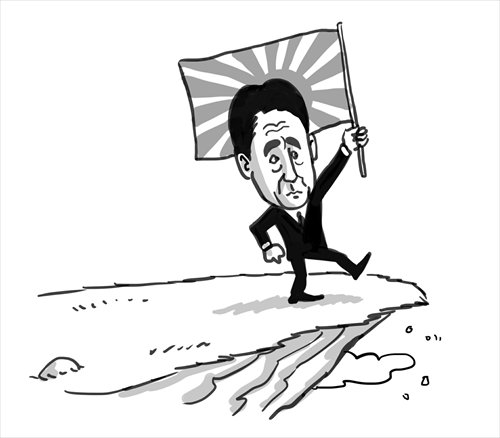HOME >> OP-ED
Hostage crisis may reinforce Abe’s strategy
Source:Global Times Published: 2015-1-26 19:38:01

Illustration: Liu Rui/GT
"Outrageous and unacceptable," as Japanese Prime Minister Shinzo Abe condemned the video showing the apparent beheading of Japanese hostage Haruna Yukawa. The prime minister is also under huge pressure to demand the release of a second Japanese national held captive by Islamic State (IS) forces. Yet no matter how outrage Japan is feeling now, Abe's options seem to be limited, which might bring about chances for him to press for a more muscular Japanese military.
Japan's high-profile role in the global anti-terrorism cooperation has made Japan a victim this time. During Abe's recent visit to Israel, Jordan and Egypt, he pledged $200 million in non-military aid to nations that are dealing with IS. That is one of the reasons why IS treats Japan as an adversary, as it claimed in the brutal video that Japan had "volunteered to take part in this crusade" against IS while "donating $100 million to kill our women and children, to destroy the homes of the Muslims ... and in an attempt to stop the expansion of IS, you have also donated another $100 million to train the (apostates)."
To be honest, there is nothing wrong with cracking down on the forces of IS, but Japan does not have enough capability to cope with emergent situations when tragedies like this happen.
It's no surprise that the first Japanese hostage was killed while Japan was trying to find every channel to reach the terrorist organization, because Tokyo could never meet the requirements of IS, no matter whether they demanded $200 million in ransom, or a swap for a female jihadist imprisoned in Jordan.
That is because the US, who is now dominating the global anti-terrorism campaign, insists that no country should yield to terrorist blackmail by offering ransoms or giving in to their demands. And the last thing Japan would do is run contrary to its ally, despite its willingness to be flexible in this hostage incident.
Thus, if Washington does not give the nod over paying the ransoms or releasing the hostage in Jordan, neither of which the White House plans to do, Japan will be trapped in the current crisis. Even though Abe has dispatched his deputy foreign minister, Yasuhide Nakayama, to Jordan to pursue final support in settling the crisis, Jordan will hardly accept Japan's appeal without the US' approval.
In this context, with almost nowhere to go in solving this crisis, Abe might see it as a good excuse to push toward a more proactive defense posture and upgrade the country's security policies, as he has always wanted.
Since January 2013, when 10 Japanese hostages were killed during a terrorist attack of Islamist militants in Algeria, Abe has started to blame the pacifist constitution, which has guided Japanese foreign policy since the end of WWII and restrained Japan from defending its residents in other nations. He then began to find all kinds of reasons to reinterpret it.
Tired of being prohibited from taking part in combat missions overseas, Abe's ambition of expanding the scope of Japan's self-defense forces has become more and more obvious in recent years with his repeated calls for Japan to take off its postwar passivity and turn into a "normal" nation in military terms. And the hostage crisis this time will give him cause to do so.
In light of this, we cannot rule out the possibilities that the Japanese attempt of rescuing the second hostage will fail, and the captive may face the same fate as the first one. But Japan will make an issue over the crisis this time, by launching a new round of efforts at shaping the direction of Japan's national security and re-militarizing itself.
The article was compiled by Global Times reporter Li Aixin based on an interview with Li Wei, an anti-terrorism expert with the China Institutes of Contemporary International Relations. liaixin@globaltimes.com.cn
Posted in: Viewpoint